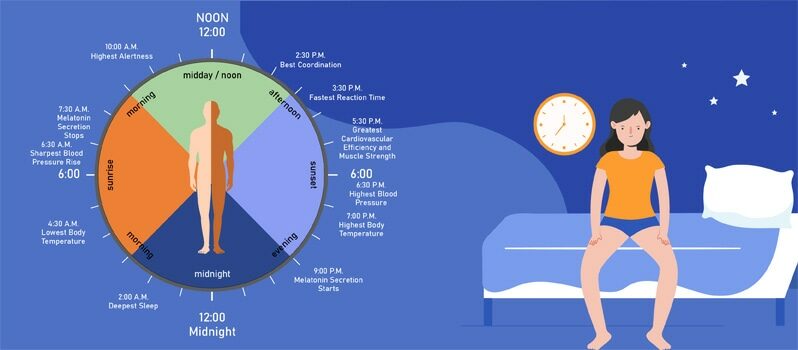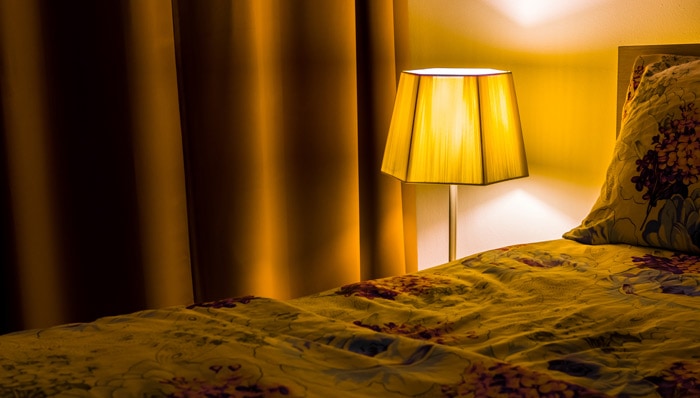How to Reset Your Sleep Schedule (Circadian Rhythm)

Knowing how to fix your sleep schedule will enable you to go to bed confident that you will wake up the next morning when you need to. Your sleep schedule should be burned into your metabolism although many people wake up at random times. This can be a nuisance if you need to get to work at the same time each day. Not only get out of bed but to be alert and ready for the day to come. Here, we will explain how to fix your sleep schedule, otherwise known as your circadian rhythm, into your metabolism to make it unlikely for you to wake up late again!
The first task is to find out why your internal clock makes you wake up late and struggle to get up and dressed in time – or even wake up too early. What factors can cause this? Why is it that your sleep schedule can fail to get you awake when you need to be? Here are a few reasons for this:
Unless you maintain a regular sleep-wake schedule, your body clock will get off track and will change. You may not be able to sleep when you should and might not wake up till you are sure to be late for work. This is when you must know how to fix your sleep schedule. Here are some ways of achieving this.
The best way to get your sleep schedule back on track is to go to bed and wake up at the same times each day. You can also use light to achieve this. When it is dark, your brain generates a hormone known as melatonin. This is generally known as the ‘sleep hormone’. When it gets light, the brain stops producing this hormone resulting in you becoming awake. There are some things you can do and some you shouldn’t do to get back into a sensible sleep cycle.

Get to Bed at the Same Time Each Night: Set yourself a time for bed. That may be 10 pm or 10.30 pm, or any other time that suits you best. Try your hardest to go to bed at that specific time every night and your internal clock will help you get to sleep at that time every night. Your sleep-wake cycle is also known as the circadian rhythm.
Bedtime Rituals: Many people not only find it hard to sleep at a specific time each night but hard to sleep period! If you can’t get to sleep when you should, then you have little chance of waking up when you need to. There are several bedtime rituals you can carry out to help you sleep.
Different people find they can relax when carrying out certain activities or rituals when it is time for them to fall asleep. You can find 15 proven relaxing bedtime rituals here. Once your body gets used to these, you will be halfway to fixing your sleep schedule. A simple example is to wash your face and clean your teeth at the same time every night. Sleep experts believe that following such rituals train your brain to believe that they signal sleep time!
Control Light and Dark: If you want to wake up at the same time each morning, then go to bed with the curtains open. The morning light will reduce your melatonin production and you should wake up. Alternatively, connect your bedroom light to a timer, which switches the lights on at a preset time. What is important is to train your body clock to send you to sleep and waken you up at the same time each evening and morning.
Most of those above are things you should do. But how about what you should not do, or even must not do in order to fix your sleep schedule? Here are some things to avoid when trying to settle into a proper sleep-wake cycle.
Avoid Things That Keep You Awake: Try to avoid activities that keep you awake. If you like to read in bed, then go to bed early and read until you are approaching your sleep time. Then get ready to sleep – lights out and get comfortable in your bed.
Do not eat a large meal just before bedtime. It can keep you awake and lead to acid reflux when you fall asleep, waking you up again. A light snack should satisfy your night hunger – make sure it does not contain energy-creating sugar.
Avoid Coffee Before Bedtime: If you tend to go to sleep at 11 pm, then no coffee from 5 pm. Also, avoid TV and other screens such as a cell phone or computer game. You will find that these tend to stimulate rather than relax you. The blue light emitted by such devices stops you from sleeping.

Avoid Naps During the Day: If you get naps during the day then you are almost sure to find it difficult to fall asleep when you should. If you feel sleepy during the day, don’t lie back and sleep, but get up and go for a walk or carry out some exercise. If you must nap, restrict it to 20 – 30 minutes.
Avoid Exercise Close to Bedtime: If you exercise in the morning or afternoon, such exercise will be beneficial to you. You will likely feel tired after your session. However, do not exercise close to your bedtime because it can keep you awake! If you do feel the need for some exercise in the evening try yoga or a simple stretching exercise that does not involve vigorous movements. Stretching your muscles and joints and yoga can feel soothing and help you sleep.
Avoid Artificial Sleeping Aids: Avoid manufactured sleeping pills, but you can use natural sleeping aids such as valerian root extract, passionflower, and melatonin.
Avoid Alcohol Before Bedtime: Avoid drinking alcohol before bedtime. Alcohol can reduce the production of melatonin leading to disrupted sleep including waking up during the night and being unable to get back to sleep.
Avoid Shift Work: Avoid shift work if you can. If you must work shifts, try to make them consistent. If you work a weekly shift pattern, you can often reset your circadian rhythm over the weekend or your off-work period.
NOTE: If you can go to bed when it gets dark and wake up when the sun rises, your sleep cycle will be reset very rapidly. Most people cannot do this, and it depends very much on the season and where in the world you live.
Try your best to get to bed and arise at the same time every day. You may treat yourself with an extra hour in bed at weekends if you must, but it is best if you can maintain the same sleeping and waking times each day. That is how to fix your sleep schedule properly back to a natural circadian rhythm. If you find sleeping difficult at first, then have a nice warm bath or shower before going to bed. This will help relax you. Some chamomile tea and chapter of a book will relax you and help you to sleep easily and well.
The best room temperature for sleeping is around 60 – 67oF give or take a degree or two. If you can set your room to that temperature then you will have a better chance of sleeping and adopting a healthy sleep cycle. You should also try to keep your worries and issues till the next day – fretting while trying to sleep will neither solve your problems nor help you sleep. Make a list of things to tackle in the morning, and you may well find that this gives you peace of mind while trying to sleep.

Here are some of the questions we have been asked by visitors to the Insidebedroom.com website.
This varies according to the metabolism of the person concerned. Several factors can establish the amount of sleep you need, although for most people 7 – 9 hours each night is best.
Blue light is light from the sun of a specific wavelength range. Solar blue light in daytime helps you to keep alert and improve your mood and performance. It is also emitted by computer monitors, TV screens and other electronic devices.
The circadian rhythm (also known as your sleep/wake cycle) is a 24-hour internal clock that runs in a part of your brain known as the hypothalamus. It cycles your brain between alertness and sleepiness. If you are sleeping well and not sleep-deprived, you will hardly notice this cycle, but if you are deprived of sleep, you will notice these swings between sleepiness and alertness a lot more. Having a regular sleep schedule helps your circadian rhythm to work properly, but things such as daylight savings, jet lag, or staying up too long can disrupt this rhythm and keep you awake when you should sleep and vice versa.
There are several things you can do to fix a sleep schedule that has gone wrong – some of these are mentioned above. You should go to bed at a regular time and have a warm bath, a relaxing shower, and a comfortable bed. Make sure you are using a comfortable pillow and relax by reading or gentle stretching or yoga. Use curtains to keep out daylight in summer months and in winter use plug-in timers for lamps or wall switch timers for the main lighting to switch off at the same time each night and come on at the same time in the morning in order to maintain a regular dark/light sequence in your bedroom.
You may have gotten into a bad sleeping habit, and have found you go to bed at midnight or even 2 am. It has been found that an all-nighter can get you back into a good sleep schedule. You usually only have to do this once! Here’s how:
Day 1: Wake up at your normal time no matter what time that is: say 8 am (it doesn’t matter as long as it is your normal waking time). Stay awake all day and night.
Day 2: Stay awake until it’s the time you want to go to bed on day 2. Let’s say you want your body clock to get you to sleep at 10 pm. Go to bed at 10 pm and fall asleep. You should find it easy to sleep – you will not have slept for 38 hours! Your body clock/circadian rhythm should now be reset.
This will not be easy to do since you must stay awake for a long time without napping. You will find it easy if you choose a day when you have some simple chores to do, but nothing that could be dangerous due to your impaired mental function. No driving, no using power tools, no height work, or anything that could harm you or others near you if you make a mistake.
Day 3: Wake up at your normal time on day 3, and you find it easy to sleep at 10 pm.
While an all-nighter may be a good way to fix your sleep schedule, it is not something you will want to do often. In fact, you should only use this method if your circadian rhythm is well out of its usual pattern. Try to maintain a healthy sleep schedule using the advice given on things to do and things to avoid. These are generally the best ways how to fix your sleep schedule before you try an all-nighter. It should also be kept in mind that the circadian rhythm controls more than just sleep, but also other functions of the brain. If it loses its regular rhythm, it can lead to a lack of sleep, depression, memory loss, and cause some other unwanted effects such as nausea and metabolic issues such as weight gain.
Donald Edwards is a sleep research expert with a deep knowledge of sleep and sleeping difficulties. He is a senior writer whose expertise and compassionate approach to establishing the fundamental causes of your sleeping issues enables us to help you to get the best night’s sleep possible and wake up fully refreshed for the day to come.
Medical Disclaimer: By using the insidebedroom.com website and/or purchasing any products or services through this website, you are voluntarily agreeing to this Disclaimer. You are agreeing that you have read, understand, and consent to the terms herein.
The information and other content found on this website, or in any linked references, are not intended to be expert medical advice and should not be construed as such. No information on this site, including written text, images, graphics and any other form of information, is intended to be a substitute for professional medical advice, treatment or diagnosis, but is intended for informational purposes only. If you need any form of medical advice or information, then refer to your physician or other medical expert.
Leave a Reply